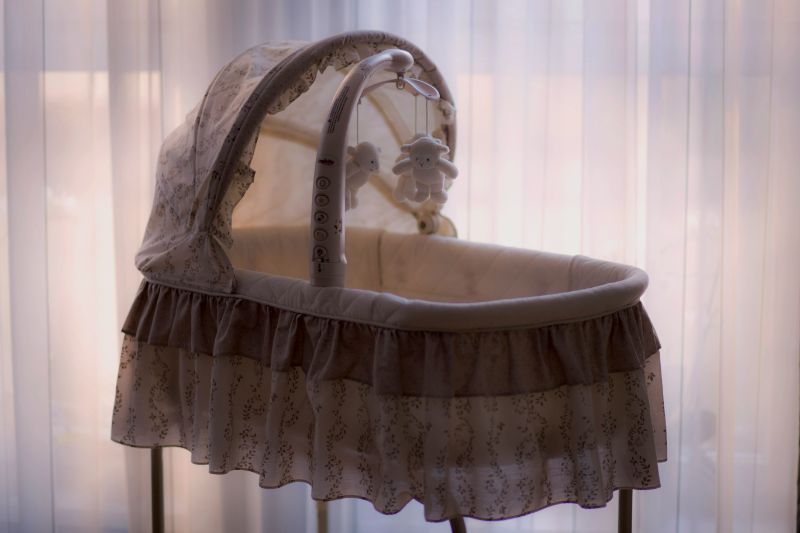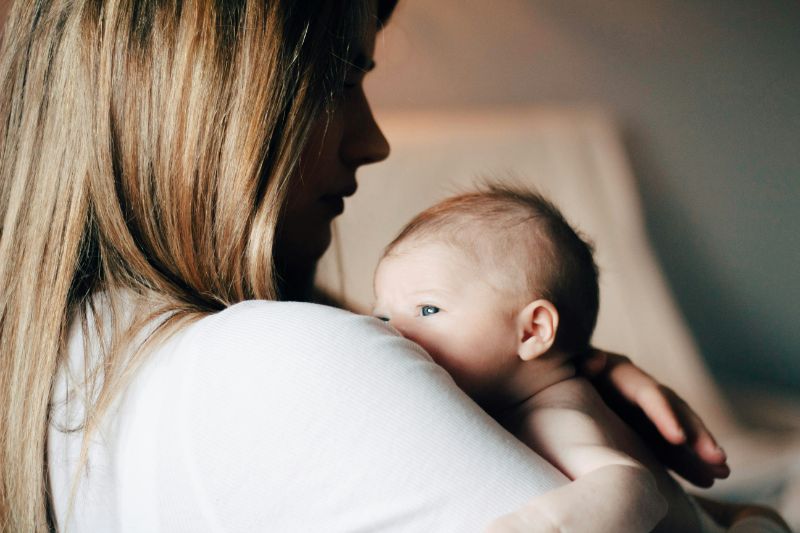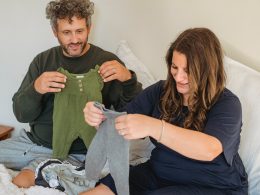Newborn won’t sleep alone? It’s a universal problem that plagues many parents. You finally get your baby to snooze in your arms. But the moment you place your little one on their cot, baby’s wide awake again. It’s mind-boggling, really. These tips on how to get a newborn to sleep in a bassinet can help you with that problem.
The first thing to do is to try to understand why your baby won’t sleep in their bassinet. Babies are very forthright with their reactions. If they refuse to go to bed, there must be a reason. (Sometimes, though, that reason might just be that they’re still having too much fun experiencing new things.)
What other reasons could there be?
Why Your Baby Does Not Like the Bassinet

Are you wondering why your baby won’t snooze peacefully on their new bassinet? Here are a few reasons why.
Comfort Zone Confusion
Being suddenly taken from a familiar bed and laid in a strange crib can make anyone uneasy. Babies love comfort; if they’re not feeling snug in their bassinet, they’ll tell you about it.
Need for Closeness
Babies are like little cuddle magnets, constantly seeking warmth and affection. So they might rebel when you tuck them into their bassinet, all because they’re craving that closeness with you.
Startle Reflex
A baby’s startle reflex babies may affect their whole bassinet situation. Every time they start to drift off into sleep, BAM! Their little arms flail out, startling them awake.
Temperature Troubles
Babies might not be able to talk, but they know how to communicate when feeling too hot or cold. They’ll tell you about it with a chorus of unhappy wails if their bassinet is too toasty or chilly.
How to get a newborn to sleep in a bassinet
Now that you have an idea why your newborn won’t sleep in the bassinet, you can get to work fixing that. Following are a few pieces of expert advice you can try. Take a trial-and-error approach until you find a solution that works for you, and more importantly, your baby.
Be consistent with the bassinet.

If your newborn won’t sleep in the bassinet, be patient but consistent.
At every bedtime, regardless of sleep regression or witching hour, always present the bassinet as your baby’s sleep “destination.” If you do this every day, at the beginning of each sleep session, eventually, your baby should associate the bassinet with sleep.
Keep the bassinet comfortable for your baby.
My daughter was one of those newborns who absolutely refused to sleep in her bassinet no matter what we did. After a month of trial-and-error starts and stops, I decided to switch the mattress that came with the bassinet with one that used memory foam. That did the trick.
One reason your baby might refuse to sleep in their bassinet could be that it’s not comfortable.
Do a thorough check of the bassinet. Is the linen scratchy and rough? Could there be material that would poke through the mattress and into your baby’s skin? Is it in a spot in the room that’s either too hot or too cold? Does the bassinet tilt to one side?
Make your baby’s room conducive to sleep.
One reason your newborn won’t sleep unless held is that they might feel more comfortable in your arms than in their bassinet. So the trick is to make the bassinet and everything else in the room as soothing as your arms.
See to it that the room is quiet, or just has white noise in the background, around bedtime. Keep the lights low. Keep the room temperature at a comfortable level.
A bedtime routine would be helpful, too. A warm bath, a soft onesie, a bedtime story, and nighttime cuddles—when you do these consistently and in the same order every day, it will help your baby adjust better to bedtime. By the time you’re done with your routine, eventually, your baby will be all too ready to sleep in their bassinet because they’ll know that’s the last step in the routine.
Calm your baby with a pacifier.
The Mayo Clinic says pacifiers can help a fussy baby fall asleep. Even better, the Clinic has found that sucking on a pacifier at nap time or bedtime may help reduce the risk of sudden infant death syndrome (SIDS).
Just make sure to let your baby settle into a nursing routine before introducing the pacifier. You don’t want the paci to disrupt breastfeeding.
If you’ve decided this may work for you and your baby, see to it that the pacifier you pick suits your baby. It has to be the right size and should also pass the safety standards recommended by the American Association of Pediatrics (AAP).
Try swaddling your little one.

To swaddle your baby means to gently wrap them up, from the shoulders down, in a light, breathable blanket so that they feel as snug as they did inside their mom’s womb.
Being wrapped up snugly also addresses your newborn’s startle reflex. In the middle of sleep, your baby’s limbs will jerk suddenly, causing your newborn to wake up. This is normal; an evolutionary and protective movement your baby had in the womb. The wide open space that is their bassinet can trigger the startle reflex. Sleeping in a swaddle can help make your newborn feel secure and safe, quieting down the startle reflex.
Swaddling, say experts, has been found to lengthen deep sleep in babies. It also minimizes the times your newborn will wake out of restlessness (though they will still wake in the night to feed). If you’re not sure how to swaddle your baby, this video will teach you how to do it correctly.
Be quick to comfort.

When my eldest was just born, unsolicited parenting advice came at me like a tsunami from family, friends, even strangers.
One piece of advice I received was particularly strange. An old lady I didn’t know approached me at a supermarket as I briskly walked to the restroom to change my fussy daughter’s diaper.
“You have to let her cry it out,” the lady told me. “Don’t pick her up too often so you don’t spoil her. Crying strengthens babies’ lungs.”
It’s a good thing I didn’t believe her because, as far as newborns are concerned, that’s the worst advice to give a new mom. Newborns are still adjusting to life outside the womb. The only way to let their needs be known is to cry. The newborn’s mental, emotional, social, and even physical development may be negatively affected if they’re repeatedly ignored.
So when your newborn won’t sleep in the bassinet and cries out, it’s perfectly fine to pick them up and help them settle down. Swaddle them. Place them back into the bassinet when they’re drowsy and see what they’ll do. If they feel safe and secure (and they will if their needs are consistently met), they might eventually surprise you and fall asleep alone.
If you’re planning to sleep train your baby, hold off until your newborn hits six month
Why is it important to get a newborn to sleep in a bassinet?
With all the anxiety brought about by wondering why your baby won’t sleep in a bassinet, you might be tempted just to stop trying. Hold that thought.
There are several reasons why pediatricians encourage new parents to allow their newborn to sleep in a bassinet. Take a look:
Safety First, Always
Designed with baby’s safety in mind, bassinets give your little one a flat, firm surface to sleep on. It prevents risky rollovers or accidental smothering that can happen when little ones sleep on a bed.
Healthy Sleep Habits
Like you, your baby needs beauty sleep to grow big and strong. But here’s the kicker—they need a lot of it! Getting them into the habit of sleeping in their bassinet from day one sets the stage for healthy sleep habits down the road.
Mom (and Dad) Time
Catch some time for yourself momma, albeit short, when your baby sleeps in their bassinet. You can finally start (or finish) a hobby, get much-needed shut-eye, or have some quality time with your partner.
Building Independence
When your little munchkin sleeps in their own space, it teaches them that being apart for short time is okay. It also helps prepare them when they transition to their big girl or big boy room/
What Sleeping Trick Works for Your Newborn?
The sleep-inducing know-how in this article can help you navigate this tricky phase in babyhood -the newborn stage. You can try one advice at a time to see what works for your baby.
Remember that every child is different. A tip that one parent swears by might fall flat in another. That’s where your parenting experience comes in! Whether you’re a seasoned parent with wisdom to spare or a newbie just figuring things out, share tips for getting your little one to embrace their bassinet.
Like this post? Click on the image below to pin it for later!












